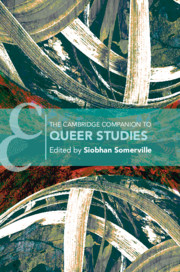Book contents
- The Cambridge Companion to Queer Studies
- The Cambridge Companion to Queer Studies
- Copyright page
- Dedication
- Contents
- Figures
- Contributors
- Acknowledgments
- Chronology
- Introduction
- Part I Genealogies
- Part II Confluences
- Chapter 3 Convergence, Dissymmetry, Duplicities
- Chapter 4 Transgender Studies, or How to Do Things with Trans*
- Chapter 5 Queer Indigenous Studies, or Thirza Cuthand’s Indigequeer Film
- Chapter 6 Queer Disability Studies
- Chapter 7 Queer Ecologies and Queer Environmentalisms
- Part III Representation
- Part IV Key Words
- Index
- Cambridge Companions to …
- References
Chapter 5 - Queer Indigenous Studies, or Thirza Cuthand’s Indigequeer Film
from Part II - Confluences
Published online by Cambridge University Press: 02 June 2020
- The Cambridge Companion to Queer Studies
- The Cambridge Companion to Queer Studies
- Copyright page
- Dedication
- Contents
- Figures
- Contributors
- Acknowledgments
- Chronology
- Introduction
- Part I Genealogies
- Part II Confluences
- Chapter 3 Convergence, Dissymmetry, Duplicities
- Chapter 4 Transgender Studies, or How to Do Things with Trans*
- Chapter 5 Queer Indigenous Studies, or Thirza Cuthand’s Indigequeer Film
- Chapter 6 Queer Disability Studies
- Chapter 7 Queer Ecologies and Queer Environmentalisms
- Part III Representation
- Part IV Key Words
- Index
- Cambridge Companions to …
- References
Summary
Although queer Indigenous studies is a new field, there is a growing number of Indigenous-authored and edited critical texts that foreground Indigenous ways of knowing. Interweaving Indigenous ways of knowing – encompassing epistemologies, histories, stories, language, spirituality, legal systems, and artistic practices – with queer Indigenous Studies is integral to Indigenous sovereignty. Using Cree ways of knowing to analyze films of self-described butch lesbian/Two-Spirit filmmaker Thirza Cuthand (Cree) opens up more complex and appropriate understandings of Cuthand’s work. wâhkôhtowin or kinship, interrelatedness, a sense of closeness or intimacy and miyo-wîcêhtowin or the principle of getting along well with others, good relations, and expanding the circle, anchors a specifically Cree reading of Cuthand’s work. Cuthand’s films are not in simply in reaction to colonization and homophobia, but are integral part of wâkhôtowin as she creates community both for herself and for queer Indigenous people.
- Type
- Chapter
- Information
- The Cambridge Companion to Queer Studies , pp. 79 - 92Publisher: Cambridge University PressPrint publication year: 2020
References
Further Reading
- 2
- Cited by

